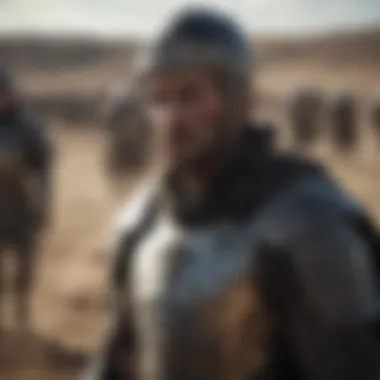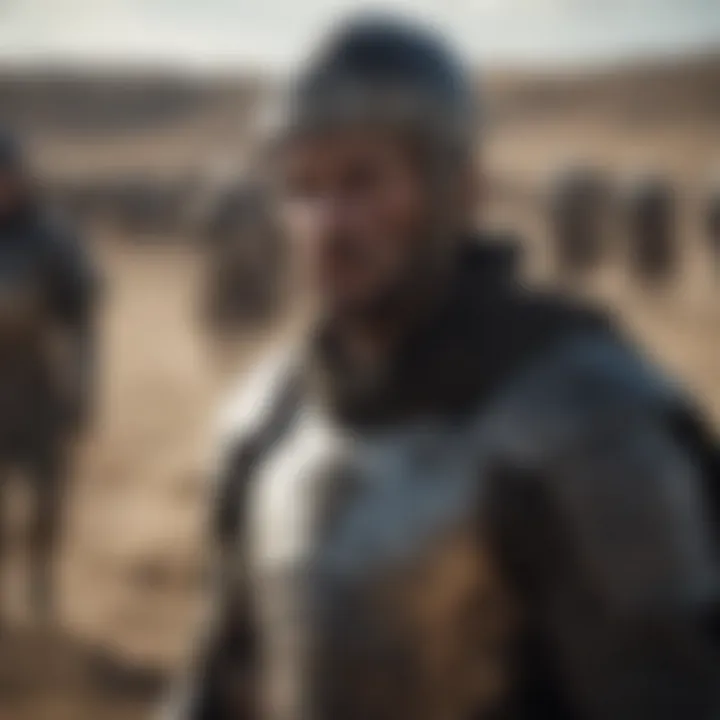Exploring Power and Morality in Game of Thrones: Roman Insights


Intro
In the sprawling narrative of Game of Thrones, a world woven with ambition, treachery, and moral quandaries, one cannot help but notice the echoes of ancient Rome. The series, while fantastical in its setting, resonates deeply with the political and ethical dilemmas faced by historical figures in Roman history. This connection lays the groundwork for a compelling exploration of how power and morality intertwine throughout the story. The analysis that follows aims to peel back the layers of character motivations, decisions, and the repercussions that ripple through the realm of Westeros, drawing parallels to the rich tapestry of Roman thought and governance.
Character Dissections
Detailed analysis of key characters in Game of Thrones
Characters in Game of Thrones are not mere puppets in a grand design; they are complex individuals shaped by their environments, their desires, and the harsh realities of their world. Take Tyrion Lannister, for instance. Much like the Roman statesman Cicero, Tyrion navigates the treacherous waters of power with wit and intelligence. Unlike many in his family, he wields his intellect as his weapon, often outmaneuvering stronger opponents through cunning rhetoric and strategic alliances. This character trade paints a striking picture of how intellect can counterbalance brute force, a common theme in Roman politics.
Character development throughout the series
Throughout the series, characters often find themselves confronted with moral questions that challenge their integrity and beliefs. Daenerys Targaryen’s journey from a timid girl to a tyrannical ruler mirrors the rise and fall of many Roman leaders who, with the allure of power, grappled with the cost of their ambitions. Her initial desire to liberate the oppressed conflicts with her later desire to rule, highlighting the struggle between altruism and authoritarianism that characterized many Roman leaders.
Impact on the overarching storyline
The interactions among characters are steeped in historical context, where betrayals mimic those seen in the annals of Roman history. For instance, the betrayal of Robb Stark by those he once called allies serves as a grim reminder of how fickle loyalty can be. In Rome, loyalty was often transactional, grounded in mutual benefit rather than principle. This theme is potent in examining the loyalties that characters forge and abandon in their quests for power.
"Power tends to corrupt, and absolute power corrupts absolutely."
– Lord Acton
Episode Breakdowns
Recap of significant events in each episode
Every episode of Game of Thrones unfolds like a historical drama, filled with events that prompt ethical reflection. For example, in the infamous Red Wedding, alliances are shattered, and moral lines are crossed, much like the purges seen in the power struggles of ancient Roman politics. Such pivotal moments not only drive the plot forward but also serve as mirrors reflecting the dark realities of ambition.
Exploration of themes and symbolism
Themes of power and morality are often symbolized through specific actions and settings. The Iron Throne itself, a brutal masterpiece wrought from swords, symbolizes the violent and tumultuous path one must take to seize power. Similarly, Roman emperors often surrounded themselves with symbols of strength and authority, underscoring the lengths to which they would go to secure their dominion.
Key moments and their implications
The complex interplay of loyalty and betrayal seen during pivotal moments, such as Ned Stark’s execution, resonates throughout the series. This mirrors the fate of many historical figures in Rome who became victims of their own ideals. Such choices offer a lens into the moral fabric of the show and carry consequences that shake the foundations of what is deemed right or justified.
Lore Explorations
Delving into the rich history and lore of Westeros
Westeros is deeply imbued with history, akin to the rich narratives woven through the chronicles of Rome. Each house, each character, carries the weight of historical precedence. The lore reveals the cultural underpinnings that guide their actions, reminiscent of how Roman citizens were often shaped by their own historical narratives and collective memory.
Uncovering hidden details and connections
The details, like the Night’s Watch and their oath, echo the Roman military practices and the heavy burden of duty and honor. Each layer of lore provides context that not only enriches the narrative but also reflects the shared values and ethical dilemmas present in Roman society.
Exploring the cultural and mythical aspects of the world
Just as Romans were steeped in mythology and traditions, characters in Game of Thrones operate within a world that is as mythical as it is politically charged. From the Ironborn’s reverence for the Drowned God to the North’s connection with the Old Gods, these beliefs shape cultural identities that often influence political dynamics, mirroring how Roman gods and myths played a role in their governance.
Fan Theories
Compilation of popular and intriguing fan theories
Fan theories flourish around Game of Thrones, driven by the intricate web of storytelling that invites speculation. Some theories draw connections between characters and historical figures from Rome, suggesting that certain arcs are reflective of Roman legends.
Evaluation of theories based on evidence from the show
Evaluating these theories against the backdrop of Roman influence offers fertile ground for analysis. For instance, many fans speculate about the fate of certain houses, drawing parallels to the rise and fall of historical Roman families. The enthusiastic discourse among fans is reminiscent of public forums in ancient Rome, where rhetoric and speculation shaped public opinion and provided insight into the political climate.
Speculation on future plot developments
As the story unfolds, fans speculate not only about the outcomes but also how the established themes of power and morality may shift. In light of Roman lessons, the potential twist in a character’s arc invokes a sense of history repeating itself, where ambition and virtue often clash, shaping destinies.
This exploration of Game of Thrones through the lens of Roman influence illuminates how purpose and ethics can navigate the turbulent waters of power, creating a riveting dialogue that transcends time and remains relevant. Through understanding these ties, viewers can gain insight not only into the series itself but also into the broader themes of governance and morality that continue to resonate in today’s world.
Intro to the Intersection of Game of Thrones and Roman Culture
The relationship between Game of Thrones, a monumental series in television history, and the political and ethical dimensions of ancient Rome runs deeper than mere coincidence. It highlights fundamental themes that not only make the story engrossing but are also reflective of the ancient power structures and moral dilemmas faced by societies throughout history. In this article, we will explore how the feuds and allegiances in Westeros echo the complexities of Roman governance, alongside moral quandaries that arise in both worlds.
By delving into this intersection, we reveal the unique influences of Roman culture on the narrative arc of Game of Thrones. This connection is more than a playful nod to history; it's a means to better understand the motives and tactics of characters within the series. It prompts viewers to confront the fragility of morality in the face of overwhelming ambition and the quest for power.
Overview of Game of Thrones as a Cultural Phenomenon
When Game of Thrones aired its first season in 2011, it quickly captured the imagination of audiences globally. With its intricate plots, morally rich characters, and a deep fascination with themes of treachery and loyalty, the show became a cultural sensation. Viewers tuned in not only for the fantastical elements like dragons and direwolves but also for the deeply human struggle for power—something viewers could relate to within their political contexts.
The narrative’s structure, managing multiple storylines across continents, could reflect the sprawling nature of the Roman Empire itself. For instance, audiences are often left pondering the ramifications of actions taken by characters like Tyrion Lannister or Daenerys Targaryen, who, in their pursuit of power, reveal complex layers of human behavior. The show adeptly mirrors the dramatic fluctuations of ancient political environments, drawing viewers into a world where alliances can shift in the blink of an eye.
The Enduring Legacy of Ancient Rome
The impact of ancient Rome extends far beyond the imperial reaches of its empire. Its governance model and cultural philosophies continue to resonate in modern societies. The concept of citizenship, rule of law, and republican ideals are just a few examples of Rome's lasting contributions. As a framework for understanding authority, Rome serves as a poignant reference point in analyzing the power dynamics presented in Game of Thrones.
Examining how rulers operated in ancient Rome—including their moral choices and the consequences thereof—provides a rich backdrop for understanding contemporary tales of power. The moral ambiguities faced by historical Roman figures often mirror those seen in Game of Thrones. For instance, characters like Cersei Lannister echo the likes of Julius Caesar by employing a calculated blend of ruthlessness and political acumen.
"Power tends to corrupt, and absolute power corrupts absolutely." – Lord Acton
The resonating themes of power and morality between the two narratives present an opportunity for a thoughtful analysis. Furthermore, understanding the societal norms that shaped both the characters in Game of Thrones and historical figures in Rome unveils a tapestry of shared human experiences. This leads us to consider not just the characters' actions in isolation, but the cultural legacies that influence behavior across ages—timeless whether in the halls of the Red Keep or the Senate of Rome.
Power Dynamics: Thrones and Roman Governance
Power dynamics play a crucial role in both the storylines of Game of Thrones and the governance of ancient Rome. This section unearths the layered complexities of authority and governance within these two narratives, exposing how quests for power can shape societies and human behavior. The political machinations and social structures present in both worlds serve as a mirror reflecting the human condition in its pursuit of control, influence, and order.
Political Intrigue in Westeros
In Westeros, political intrigue is practically its lifeblood. The characters operate in a landscape where every alliance can be undone with a whisper, and every friendship is overshadowed by the specter of betrayal. A prime example is Tyrion Lannister, who continually navigates the treacherous waters of court politics with a blend of wit and strategic acumen. His character exposes the depths to which one must sink to gain power in a world defined by chaos and ambition.
Characters like Cersei and Littlefinger epitomize how personal desire intertwines with the broader political context. These figures engage in a game that is both ruthless and calculated; they embody the harsh reality that loyalty is often bought rather than earned. The infamous Red Wedding highlights how political maneuvering can culminate in acts of extreme violence, a chilling reminder that in this world, honor and morality take a back seat to survival.


Additionally, the role of houses and their banners serves as a constant reminder of how factions, like the Starks and the Lannisters, represent not just families, but entire ideologies. Each house has its strengths and weaknesses, dictating alliances and rivalries. This landscape demonstrates that in both power dynamics and governance, loyalty is fluid, and the rules are updated at a moment's notice.
Rome's Approach to Power and Authority
Turning to Rome, the complexities of power can be seen through the lens of political institutions and social hierarchies. The Roman Republic initially exemplified a carefully crafted system of checks and balances, yet this structure often crumbled under the weight of ambition and personal gain. Figures like Julius Caesar and Pompey demonstrate how personal ambition can lead to the subversion of these systems, altering the course of history.
Power in Rome was deeply enmeshed with public perception and personal support. Influential politicians often used rhetoric and public displays to consolidate their power, quite akin to the political theater seen in Game of Thrones. The Senate, a symbol of authority, was not necessarily a bulwark against corruption; it was more of a stage on which power plays were performed.
Moreover, the idea of clientelism loomed large in Roman society, where powerful figures offered protection and assistance to lesser status individuals in exchange for loyalty and support. This mirrors the political maneuvering seen in Westeros, where characters often trade favors to forge alliances, revealing a universal truth about human relationships across cultures and epochs.
Political systems, whether in Westeros or ancient Rome, reveal that power is often fragile. Trust, once lost, is nearly impossible to regain.
In both narratives, the pursuit of power leads to a range of ethical dilemmas and moral decay that can ripple through societies. The consequences of ambition, manipulation, and betrayal invite us to reflect on the nature of authority itself and what it costs those who seek it.
Moral Ambiguities in Character Arcs
The exploration of moral ambiguities within character arcs is a crucial component in understanding the profound impact of Roman influences on Game of Thrones. It lays bare the intricate weaving of ethics and power, revealing how characters become embodiments of complex decisions and moral dilemmas, often reminiscent of historical figures from ancient Rome. This intertwining of moral complexity enhances the narrative depth and allows for a richer engagement with the audience on philosophical levels.
The Complexity of Characters in Game of Thrones
Characters in Game of Thrones are remarkably multifaceted, shaped by their environments, experiences, and choices. For instance, characters like Jaime Lannister and Tyrion Lannister showcase an evolution that challenges traditional notions of good and evil. Jaime's journey from a seemingly arrogant knight to a more introspective figure reflects deep-seated conflicts regarding loyalty, love, and honor. Likewise, Tyrion navigates a world that consistently underestimates him, compelling him to make morally ambiguous decisions, which leave audiences questioning the validity of his actions.
Another salient example is that of Daenerys Targaryen. Her transformation from a pawn in her brother's game to a powerful leader paints a picture of inspirational ambition shadowed by destructive tendencies. Each choice she makes, from freeing slaves to burning cities, pulls the viewer into a labyrinth of moral contradictions, emblematic of the broader human struggle between the noble and the tyrannical.
The complexity extends beyond individual arcs; it reflects the wider societal norms within Westeros, where power maneuvers often blur ethical lines. Characters must grapple with the implications of their choices in a world that rewards ruthlessness. This mirrors Roman history, where leaders often faced similar crises of conscience, caught between the ambitions of statehood and the ethical considerations it entails.
Roman Philosophical Influences on Ethics
When examining the ethical frameworks of ancient Rome, it's essential to consider philosophical doctrines such as Stoicism and Epicureanism, which heavily influenced Rome’s approach to morality. Stoicism, in particular, taught the importance of virtue and reason in navigating the complexities of life. The Stoics argued that moral integrity remained paramount, even in the face of adversity or power struggles.
Incorporating these philosophical perspectives into Game of Thrones characters offers deeper insights into their motivations and moral quandaries. Littlefinger's pursuit of power, for example, raises questions about the role of ambition versus moral responsibility. His Machiavellian tactics starkly contrast with the Stoic calls for integrity and virtue. Meanwhile, characters like Jon Snow, who embody bravery and honor, provide a counterbalance, often making choices that reflect Stoic ideals.
Both regimes echo the Roman moral landscapes—emphasis on duty, honor, and consequence. In essence, Game of Thrones characters grapple with ethical decisions akin to those faced by Roman statesmen, weaving a rich tapestry that reflects on humanity’s unchanged moral struggles throughout history. Thus, the stories we consume resonate beyond mere entertainment; they serve as a profound commentary on the enduring battle between power and ethical integrity.
"The greatest enemy of knowledge is not ignorance, it is the illusion of knowledge." - Stephen Hawking
Women in Power: A Comparative Analysis
The portrayal of women in positions of power serves as a vital focal point in both Game of Thrones and ancient Rome. Analyzing how prominent female figures navigate the treacherous waters of authority sheds light on the broader implications of their actions within their respective societies. The multifaceted roles played by these women not only enhance our understanding of gender dynamics but also challenge the perceptions of power and morality inherent in both cultures. By comparing the narratives and societal reactions around female leaders in Westeros and Rome, we can glean a deeper insight into the societal values and cultural contexts that shaped their experiences.
Prominent Female Figures in Game of Thrones
Game of Thrones paints a vivid picture of female characters who defy traditional norms, displaying a range of power—from cunning political maneuvering to brute strength. Characters like Cersei Lannister, Daenerys Targaryen, and Sansa Stark exemplify how women can exploit the patriarchal structures surrounding them to further their own ambitions. Cersei’s relentless quest for power stems from her desire to assert control in a world that typically sidelines women. She wages war, navigates alliances, and ultimately sits on the Iron Throne, albeit temporarily.
"The things I do for love" — Cersei Lannister examines the lengths to which she will go to protect her family and secure her position.
Daenerys, often referred to as ‘the Breaker of Chains,’ embodies the liberation of oppressed peoples, but her path is marred by moral quandaries as she struggles with the weight of leadership. Sansa Stark's evolution from a naïve girl to a seasoned political player shows that wisdom can thrive amid chaos. Each character reflects the complexities of moral struggles inherent in positions of power, making their arcs not just exciting, but deeply resonant.
Roman Women and Their Societal Roles
In ancient Rome, women’s roles were often relegated to domestic spheres, yet some transcended these limitations magnificently. Figures such as Livia Drusilla, wife of Emperor Augustus, wielded enormous influence despite being outside formal positions of power. Livia's strategic use of family loyalty and political alliances illustrates how women navigated the patriarchal framework, similar to their counterparts in Westeros.
While women's rights in Rome were severely constrained, their moral influence could sway powerful decisions. The Vestal Virgins, dedicated to the goddess Vesta, held a unique status that offered both respect and power through their role in maintaining the city's sacred flame. This religious position not only granted them social standing but also a degree of political influence as they could undermine or support various factions or leaders.
In both Game of Thrones and Roman history, women have managed to carve out spaces for themselves within systems designed to oppress them. Their stories highlight the ongoing struggle for agency against the backdrop of societal norms that seek to limit their influence. The examination of these women provides crucial context about the interplay of gender, authority, and ethics in both narrative landscapes.
The Concept of Honor and Loyalty
The themes of honor and loyalty serve as fundamental pillars in both Game of Thrones and Roman culture. This intricate interplay shapes the narrative, character arcs, and the moral dilemmas faced by individuals within these worlds. Honor is not merely a set of rules; it's a principle that dictates the actions and motivations of characters, reflecting their values and virtues. Loyalty, on the other hand, often intertwines with honor, creating a complex web of allegiances that can lead to honorable actions or dire consequences.
In Game of Thrones, the concept of honor is embodied in various families, particularly the Starks. Their unwavering commitment to honor acts as a guiding light, but it also places them in perilous situations. This duality prompts audiences to contemplate the effectiveness of honor in a realm rife with betrayal. On the flip side, Roman military culture revered loyalty as a key element to sustain order and victory, emphasizing that soldiers must remain loyal to their leaders and comrades, often at great personal cost. Here, the adherence to loyalty and honor becomes not just a personal philosophy but a societal expectation that fuels ambition and conflict.
Honor Among the Starks
The Stark family represents the embodiment of honor in the Seven Kingdoms. Figures like Ned Stark, who is often seen as the moral compass of the series, illustrate how honor shapes their decision-making. Ned’s insistence on upholding his principles leads to his downfall in King’s Landing, revealing a stark reality: honor, while noble, can be a liability in a world where deceit reigns.
This loyal adherence to personal codes is central to Stark identity. The phrase "The North Remembers" encapsulates their collective memory of loyalty and honor, especially in times of betrayal. Additionally, the trajectory of characters such as Sansa and Jon Stark shows how the younger generation grapples with this legacy. They must navigate a world that often punishes integrity while seeking to forge their paths and define what honor means for them.
The Stark motto, "Winter is Coming," serves not only as a warning but also as a reminder of the necessity of preparation and loyalty to one’s own, a thread that runs deep through their history.
Loyalty in Roman Military Culture
In ancient Rome, loyalty was not just a virtue but a vital component of military success and social stability. Soldiers were bound by oaths to their generals and the state, ensuring that personal ambitions did not overshadow collective goals. This loyalty was often codified through rigorous training and discipline, where failure to adhere could lead to dire consequences.
The Roman army showcased a structure where loyalty expanded beyond individual soldiers to entire legions. For instance, the loyalty displayed during events like the betrayal of General Julius Caesar illustrates a poignant aspect of this culture—loyalty can lead to glory but also treachery. When Brutus turned against Caesar, it was not just a personal betrayal; it shattered the very fabric of trust.
Roman historiography often highlights the tension between personal honor and loyalty to Rome. Leaders like Augustus understood the weight of loyalty, promoting it as a virtue to unify the empire. However, as with the Starks, this loyalty often came with moral implications that reverberated through generations.
Battle Strategies: A Study in Warfare
Understanding battle strategies in both Game of Thrones and ancient Roman warfare reveals layers of intricacy that go beyond mere skirmishes. The significance of this topic in the context of power and morality is crucial; it highlights not only the physical confrontations but also the underlying motivations, psychological tactics, and ethical dilemmas inherent in warfare.
In the world of Game of Thrones, battles serve as a stage for character development, showcasing their ambitions, failures, and moral choices. Meanwhile, Roman military strategies offer a historical perspective that helps illuminate the effectiveness and consequences of such tactics. By intertwining these narratives, we can see how both franchises comment on the nature of power and the moral implications of conflict.
Military Tactics in Game of Thrones
The military tactics employed in Game of Thrones are as diverse as the characters who wield them. One major example is the ambush strategy, which was masterfully illustrated during the Battle of the Bastards. Here, Jon Snow faced off against Ramsay Bolton, famed for his ruthless cunning. Ramsay utilized the terrain to his advantage, placing the Stark forces in a vulnerable position. This scenario features elements such as:
- Use of Terrain: The Bolton forces had higher ground, showcasing the importance of geography in warfare.
- Psychological Warfare: Ramsay’s tactics included demoralizing Jon by threatening Rickon Stark, emphasizing the moral decay that can accompany power struggles.
- Adaptive Strategies: Jon’s ability to pivot from a defensive to an offensive stance demonstrates the importance of flexibility in combating unexpected moves by the enemy.
Through these strategies, the narrative reveals deeper questions about loyalty, sacrifice, and the heavy price of ambition.
Roman Military Innovations and Strategies
In ancient Rome, military strategies were marked by discipline and innovation. The Roman legions were known for their adaptability and organization, allowing them to conquer vast territories. Some noteworthy strategies included:
- The Testudo Formation: Soldiers would align closely, creating a shield wall that protected them from missiles during advance.
- Siege Warfare: Romans were adept at using siege engines and tactics to breach fortified locations, demonstrating a blend of ingenuity and perseverance.
- Rapid Mobilization: The ability to quickly deploy troops across various terrains was crucial for maintaining dominance, which Roman generals like Julius Caesar mastered.


"Victory belongs to the most persevering."—Napoleon Bonaparte. This captures the essence of both the Roman military ethos and the strategies seen in Game of Thrones: wittiness and endurance in the pursuit of power.
This comparative study of battle strategies not only sheds light on historical context but simultaneously addresses moral considerations that accompany the exercise of power, making the battles in both narratives resonate with viewers and readers on multiple levels.
Religious Undertones and Paganism
In both Game of Thrones and ancient Roman society, the notion of religion holds a significant role. The characters and their decisions are often colored by the layers of faith they subscribe to. This complexity isn’t simply a backdrop but serves as a driving force that shapes actions and consequences.
Faith and Belief Systems in Game of Thrones
Religion in the world of Game of Thrones is far from homogenous. The tapestry of faiths weaves a rich fabric that influences everything from character motivations to broader political strategies.
For instance, the Faith of the Seven stands as a prominent institution with its own doctrines and rituals. It reflects a centralized belief structure akin to organized religions we see today. Through characters like Cersei and her overt manipulation of faith and power, the show illustrates how religious affiliation serves as both a weapon and a shield.
On the flip side, we see the Old Gods of the North, where worship feels more instinctual, rooted in nature and the land. Characters such as Jon Snow and the Stark family often embody this connection to the past, revealing a more spiritual yet vague understanding of faith. This duality opens up discussions on what drives people to believe and how these beliefs can be used to justify actions.
The Lord of Light introduces another dimension, presenting a stark contrast to the other faiths. Melisandre's unwavering faith in R’hllor illustrates fanaticism and the manipulation of religious conviction for political gains. This interplay shines a light on how belief can shape destinies, both for good or ill, creating an intriguing discussion about the ethics behind such beliefs.
Roman Religion: Polytheism and Its Impact
In ancient Rome, religion flourished through a rich tapestry of gods and rituals, deeply embedded within the fabric of daily life. The polytheistic nature of Roman religion offered various deities, each perceived as governing different aspects of existence, from war and wisdom to love and agriculture.
This pluralism created an atmosphere where religion didn’t just serve the spiritual needs of the populace but also reinforced political structures. Emperors, for example, often positioned themselves as divine or semi-divine figures, exemplifying the merging of state and religion.
Here are few significant impacts of Roman religion:
- Social Cohesion: Shared rituals and festivals fostered unity among people, despite geographical differences. This is mirrored in Game of Thrones, where public ceremonies serve to strengthen bonds among various factions, much like the Roman games.
- Political Legitimacy: Just as Roman leaders invoked the approval of the gods to justify their reign, leaders in Game of Thrones, like Daenerys, often frame their rule around divine or predestined choices, showing how power can manipulate religious sentiment.
- Cultural Preservation: The veneration of ancestors and traditional gods maintained a strong sense of identity among Romans. Similarly, the Old Gods in Westeros symbolize a connection to ancestral roots, illustrating how the past influences the present actions.
In summation, both Game of Thrones and Roman theology showcase how religious undertones shape not only individual motivations but also larger societal frameworks. The complexities of faith create a web of intrigue that adds depth to the narrative, offering both characters and viewers a lens through which to ponder the moral implications of belief on the grand stage of power and ambition.
"Religion is the opiate of the masses,” Karl Marx famously stated. In Game of Thrones and ancient Rome, we see both the dire consequences and the potential for humanity's higher aspirations through the lens of faith."
Themes of Betrayal and Revenge
In both Game of Thrones and Roman history, the themes of betrayal and revenge aren't just plot devices; they are the beating heart of the narrative. These elements serve as powerful lenses through which we can examine the underlying motivations of characters and societies. The fabric of loyalty is often frayed by treachery, revealing a stark duality in human nature where trust and deception coexist. This duality not only drives character development but also acts as a mirror reflecting the moral ambiguities faced by individuals in positions of power.
The significance of betrayal and revenge in this article lies in understanding how these themes shape the moral landscape of Game of Thrones, drawing clear parallels to the political machinations of ancient Rome. By analyzing key betrayals, we can unravel the intricate layers of loyalty, ambition, and the quest for power. These betrayals illustrate a relentless drive for retribution, painting a grim picture of human relations where noble intentions often spiral into cycles of violence.
Key Betrayals in Game of Thrones
Betrayals thrown in the face of trust are central to the evolution of relationships in Game of Thrones. Perhaps one of the most significant betrayals occurs in the first season when Ned Stark, the embodiment of honor, is misled by those he considered allies. His decision to confront Queen Cersei about the true parentage of her children sets into motion a chain of events that ultimately costs him his life. This betrayal underscores the fragility of loyalty, particularly in a world governed by ruthless ambition and political maneuvering.
Another notable betrayal arises with Petyr Baelish, a character whose duplicity knows no bounds. Littlefinger’s manipulation of the Stark sisters, particularly Sansa, illustrates a convoluted web of deceit that has far-reaching consequences. His ambition to climb the social ladder showcases how betrayal can masquerade as strategy, reinforcing the idea that in the game of thrones, there are few truly innocent parties.
Additionally, consider the relationship between Jaime Lannister and Brienne of Tarth. What starts as a begrudging alliance imposed by circumstance gradually morphs into a relationship rife with tension. Jaime ultimately betrays his own family’s legacy by siding with Brienne during critical moments, suggesting that loyalty can also be subverted in favor of personal morality. This act of betrayal, while ostensibly noble, showcases the complexity of human motives, leaving viewers questioning where true loyalty lies.
Noteworthy Acts of Betrayal in Roman History
Transitioning from the fictional realm of Game of Thrones to the annals of Roman history reveals a tapestry thick with betrayal, where trust was often outweighed by political necessity. One of the most infamous betrayals recorded is that of Julius Caesar by Brutus, a man who was not only his protégé but also his friend. The act of stabbing Caesar was a significant culmination of political strife and personal disillusionment. It embodied the struggle between loyalty to a friend and loyalty to the Republic, showcasing how the corridors of power are often paved with betrayal.
Another critical betrayal in Roman history is the downfall of Emperor Nero. His reign, marred by suspicion and cruelty, saw many of his closest allies fall victim to his paranoia. The political machinations that led to the execution of powerful figures like Seneca reflect a brutal reality where friendship and trust are mere illusions in the greater pursuit of power.
Lastly, the betrayal of the Senate by the emperors Augustus and Tiberius forged a new era where loyalty was determined not by integrity but by survival. In this light, the treachery of one led to the security of another, much like the characters in Game of Thrones.
Thus, both realms reveal betrayal not only as a turning point of character arcs but also as a critical thread weaving through the moral fabric of society. The examination of these themes in both narratives provides a broader understanding of the consequences of betrayal and the relentless quest for revenge.
The Role of Propaganda and Information Control
The role of propaganda and information control stands as a pillar in shaping the narratives and power dynamics within both Game of Thrones and ancient Rome. This section highlights how the manipulation of information constructs societal narrative, plays into political strategies, and influences public perception. These elements are crucial to understanding the machinations of power as they reveal the subtle yet profound impact of information on both the rulers’ ambitions and the populace's beliefs.
Mystique of Propaganda in Westeros
In Westeros, propaganda manifests not merely as communication but as a thorough strategic tool in the quest for power. Characters like Petyr Baelish and Cersei Lannister exemplify the artful use of misinformation to induce fear or admiration among their subjects. They weave webs of deceit that warp reality to their advantage. For instance, the notorious phrase "The North Remembers" echoes through the realm, serving both as a rallying cry and a psychological tool to instill loyalty among the Stark loyalists.
Furthermore, visual representation plays a significant role in propaganda. The sigils of the houses symbolize not just identity but also power; for example, the direwolf of House Stark evokes a sense of wild nobility, while the lion of House Lannister brings forth images of strength and dominance. These symbols are strategically employed to reinforce loyalty and garner support.
The narrative in Game of Thrones demonstrates the effectiveness of propaganda through The Red Wedding, a pivotal event that showcases how information and perception can turn allies into foes in the blink of an eye. By controlling the narrative and wielding misinformation, characters maneuver their way to the top, revealing the powerful interplay between perception and reality.
Information Warfare in Ancient Rome
Turning our gaze to ancient Rome, one can identify a similar pattern of manipulation surrounding the information flow. The Roman elite mastered the mechanics of propaganda to solidify their power. Take, for instance, the orations of Cicero, whose speeches transformed not just public opinion but also political landscapes. His ability to sway the masses embodied the potent influence of rhetoric in ancient politics.
Roman emperors employed various channels—public festivals, literature, and even architecture—to propagate favorable narratives about their reigns. Consider Augustus, who carefully curated his image as a benevolent leader through the reconstruction of Rome and the promotion of the Pax Romana. Such propaganda shaped the collective memory of Roman citizens and positioned Augustus as a revered figure.
Moreover, state-sponsored art and public inscriptions played a crucial part in reinforcing the emperor's ideals. Monuments like the Ara Pacis stand today as enduring testaments to the power of visual propaganda. These structures weren't merely for aesthetic pleasure but were intended to convey a message: peace follows strength, and strength follows leadership.
Legacy and Historical Context
Looking at Game of Thrones through the influence of Roman culture not only sheds light on the show's themes but also anchors its legacy in a much broader historical narrative. Understanding how ancient Rome's political complexities, societal norms, and ethical frameworks resonate within this fantasy series makes the connection not just intriguing, but profoundly essential. One of the cruxes of this emerging legacy revolves around how power and morality are intertwined, serving as the bedrock for character motivations and plot development.
A significant aspect of this legacy can be seen in the way that Game of Thrones addresses power dynamics and individual choices. From the ruthless ambition of House Lannister to the moral quandaries faced by Jon Snow, the complex interplay of ethical dilemmas mirrors the choices made by Roman leaders. These characters navigate their environments much like historical figures in Rome, grappling with issues of authority, loyalty, and betrayal—elements that are just as vital today as they were in ancient times.
Moreover, the narrative influences can be perceived in the shaping of characters who reflect both epic heroism and tragic flaws. This duality resonates through the ages, illustrating timeless human struggles that make the story relatable across generations. These themes of ambition, betrayal, honor, and morality have not only left a mark on fan culture but also affected storytelling methods in fantasy genres profoundly.
The benefits to fans are manifold: Game of Thrones serves as a lens through which contemporary audiences can explore complex historical narratives and ethical dilemmas without the constraints of strict realism. Viewers are encouraged to consider the long-term implications of their choices, much as ancient Romans experienced and documented in their cultural lore. This interplay adds a layer of depth, enriching the narrative tapestry and prompting discussions that span beyond the series itself.
Ultimately, the legacy of Game of Thrones isn't fixed in its ending, but rather finds strength in how it compels audiences to grapple with the very concepts of power and morality. The examination of this legacy highlights the importance of context—both historical and fictional—reminding us that past undercurrents continue to influence contemporary storytelling.
"The illusions of power, once they infect the minds of men, can easily lead to the downfall of warriors and the ruin of empires"
Long-Term Impact of Game of Thrones
The long-term impact of Game of Thrones stretches far beyond its last episode, enticing viewers with something that feels almost like a shared cultural currency. One cannot ignore how it revitalized interest in the fantasy genre, paving a way for a flood of similar narratives inspired by its success. Yet, beyond its immediate commercial achievements, the show left an indelible mark in how storytelling unfolds across various media, especially in relation to previously established historical narratives.
Aspects such as complex moral structures and ethical decision-making have become more critical in screenwriting. Future writers look back on the moral challenges faced by characters like Daenerys Targaryen and Sansa Stark, recognizing that character development must more deeply engage with ethics. The influence of Roman history looms large in this regard; as viewers draw parallels with the tragic tales of figures like Julius Caesar or Nero, new stories emerge to explore the consequences of unchecked ambition and morality.
This impact is not limited to television alone. The influence is evident across literature, video games, and even tabletop role-playing games. These platforms often incorporate the same intricate layers of political intrigue that defined Westeros, emphasizing that the legacy of Game of Thrones transcends mere viewing and seeps into the broader fabric of storytelling.


The Lasting Influence of Roman Society
Exploring the lasting influence of Roman society on Game of Thrones doesn't necessitate a deep dive into historical texts; the parallels are as striking as they are resonant. Roman customs, political strategies, and social structures reverberate through the actions and fates of characters throughout the series. The Romans' persistent grappling with concepts of empire and citizenship finds its echoes in Westerosi allegiances and conflicts.
Notably, themes of power and governance hark back to both Roman leadership models and the brutal politics of the Iron Throne. For instance, Tywin Lannister, with his strategic ruthlessness, resembles figures like Augustus, who employed cunning to consolidate power and establish stability in a Rome fraught with chaos. This intertextual linkage not only enriches viewers' understanding of Game of Thrones but also provides a refined lens through which to examine the broader implications of leadership and ethics depicted in both realms.
Furthermore, the societal roles of characters such as Cersei Lannister or Daenerys Targaryen can be scrutinized alongside historical precedents—women in ancient Rome had pivotal, albeit often overlooked roles. Analyzing this within the context of female empowerment and political maneuvering enhances our understanding of how historical narratives influence modern ones. The cyclical nature of power becomes evident; soils transformed in history, from ancient Rome through to the Struggles in Westeros, showcase the universal struggles for dominance and virtue.
In summation, while Game of Thrones exists as a standalone narrative, its resonance with Roman society's complexities allows for a richer discourse that continues to engage audiences. This synergy between historical knowledge and modern storytelling delves into the nuances of morality and power, ensuring that players in this vast narrative remain forever entrenched in the moral tales of human ambition.
Comparative Analysis of Rulers
The realm of power and its intricate dance with morality is not merely a backdrop in Game of Thrones; it serves as the foundation for character development and plot-line evolution. Examining the rulers, both in Westeros and ancient Rome, offers insights into how authority is negotiated, wielded, and, at times, abused. This section aims to draw parallels that illuminate the motivations behind notable decisions made by these rulers and how their legacies are shaped through the lens of ethical considerations and societal impacts.
Leaders of Westeros: A Detailed Look
Westeros is populated with a mix of characters, each embodying unique leadership styles that reflect their backgrounds, values, and the tumultuous environments they navigate. From the honorable Eddard Stark to the ruthless Cersei Lannister, the rulers exemplify various approaches to power.
- Eddard Stark: His commitment to honor eventually leads to his demise. Stark’s moral compass, though noble, clashes with the pragmatism needed to survive in his brutal world. His unwillingness to compromise could be seen as both a flaw and a virtue, drawing lines between personal ethics and political pragmatism.
- Cersei Lannister: In a stark contrast, Cersei’s journey reveals how desperation for power can morph a character. Her tactics include manipulation, deceit, and a fierce loyalty to family, pushing ethical boundaries to maintain control within the chaos of the realm. Her narrative underscores the extent to which morality is bent in the pursuit of authority, showcasing the potential corruption of power.
- Jon Snow: Elected to lead the Night's Watch and later the North, Jon’s leadership is characterized by his empathy and sense of duty. However, his internal struggles underscore the challenge of balancing personal morals with the demands of leadership, echoing themes found in Roman governance.
Notable Roman Emperors and Their Tactics
The annals of Roman history present rulers whose reigns illustrate a spectrum of governance styles, radiating through time into the narrative of Game of Thrones. The tactics employed by these emperors reflect not just the political acumen but the moral dilemmas they encountered in wielding power.
- Julius Caesar: His crossing of the Rubicon is a vivid exemplification of defiance against the Senate. Caesar's blend of populism and military might shaped not just his fate, but the trajectory of Rome. His ambition ultimately led to his assassination, reminiscent of the political betrayals witnessed in Westeros.
- Nero: Often portrayed as the archetype of tyranny, Nero’s rule highlights the degradation of morality in pursuit of self-indulgence. His inclination to blame Christians for societal problems echoes symbols of scapegoating found in Westerosi narratives, portraying how power can corrupt even the most seemingly legitimate authority.
- Augustus: Conversely, Augustus provides a model of stability achieved through shrewd manipulation of public perception and political restructuring. His reign, which saw the advent of the Pax Romana, emphasizes the delicate balance rulers must strike between maintaining control and upholding societal stability.
As we delve into these characters and historical figures, one begins to see the patterns of moral quandaries each faced, and the lengths to which they would go to sustain their reigns. The narratives around these leaders are not just historical footnotes; they lie at the heart of what it means to be a ruler, intersecting deeply with the thematic fabric of Game of Thrones.
"The arc of power is a tangled web of motives, wherein morality often finds itself ensnared."
This comparative study invites readers to reflect on how authority shapes individual destinies and the ethical implications of decisions made by rulers, encouraging deeper engagement with the narratives that define both Westeros and Rome.
Conflict and Resolution in Narrative Structure
Conflict and its resolution form the backbone of any compelling narrative, and this is particularly true for both Game of Thrones and the narratives of ancient Rome. The exploration of these two worlds reveals the nuanced interplay between power, morality, and human experience. In Game of Thrones, conflicts typically arise from deeply entrenched ambitions, allegiances, and historical grievances, offering a fertile ground for character development. These conflicts often push characters into moral quandaries, leading to moments that define their arcs and the overall story.
In the context of this article, the examination of conflict and resolution serves to illuminate how these themes not only reflect the struggles within the world of Westeros but also echo the political and social dramas of Roman history. Understanding these dynamics helps to clarify how storytelling techniques are employed in both narratives to engage audiences on a profound level, revealing the emotional stakes behind political maneuvers.
Analyzing Conflict in Game of Thrones
Conflict in Game of Thrones is multifaceted, manifesting in personal rivalries, family feuds, and grand political struggles. The series starts with a simple power struggle—the Iron Throne—but soon spirals into a web of overlapping conflicts. Characters like Ned Stark and Cersei Lannister embody the stark contrasts in approaches to power, ethics, and loyalty. When Ned Stark perceives a threat to his sense of honor, it positions him at odds with Cersei, marking a pivotal turning point in the series.
Each conflict is not merely a contest for power but also a reflection of deeper moral questions. For instance, Daenerys Targaryen's rise from a pawn in her brother's game to a powerful queen raises significant questions about justice and retribution. As she makes her way across the Narrow Sea, her methods of conflict resolution shift from securing alliances to seizing power through fear and destruction. This evolution in her character underscores how the pursuit of power can distort one’s moral compass.
Furthermore, dramatic moments, such as the Red Wedding, starkly illustrate the brutal reality of betrayal, wrapping human emotion into the broader themes of survival and vengeance. Here, personal relationships dissolve under the weight of conflict, reinforcing the series' bleak view on the consequences of ambition. It often prompts viewers to reflect on the price of power and the ethics of loyalty.
Roman Approaches to Conflict Resolution
Conflict resolution in ancient Rome is characterized by both political savvy and military strength. Roman leaders strategically navigated internal discord and external threats through a combination of diplomacy, warfare, and legislative reforms. The Roman Senate often acted as a bedrock for resolving disputes, emphasizing consensus over chaos, although not without its own power struggles.
Leaders like Julius Caesar utilized resolute actions to consolidate power, showcasing that sometimes the quickest resolution means decisive action—even at the cost of personal relationships. His crossing of the Rubicon wasn't just a military maneuver; it symbolized a pivotal choice that encapsulated Rome's volatile political landscape.
Moreover, conflict resolution in Rome was significantly influenced by cultural norms surrounding honor and virtue, aspects that echo within Game of Thrones. Roman soldiers often adhered to a code of conduct, showing loyalty to their leaders while society placed great value on the public resolution of disputes. Public trials or public assemblies often served as platforms for addressing grievances, reminiscent of the council meetings seen in Game of Thrones.
In sum, both Game of Thrones and Roman history reveal that conflict and its resolution play critical roles in shaping narratives. These stories resonate with deep insights into human nature, power struggles, and ethical dilemmas that continue to inform contemporary discussions on governance, morality, and the human experience.
"In the end, it's not just the battles won or lost that define us, but how we resolve those conflicts and the lessons learned along the way."
By examining both narratives, we can unearth the layers that make them resonate across time and culture, guiding our understanding of power, morality, and the choices that shape our world.
Symbolism and Allegory
In both Game of Thrones and Roman literature, symbolism and allegory serve as key tools for exploring deeper themes of power, morality, and human nature. These elements enrich the narrative, allowing viewers and readers alike to engage with the content on multiple levels. The use of symbols can often lead to varied interpretations, reflecting the complexities of leadership and ethical decision-making, akin to the choices faced by figures in Roman history. The interplay of these artistic devices not only enhances storytelling but also invites a dialogue with the audience about the moral implications of the characters' actions.
Notable Symbols in Game of Thrones
Game of Thrones is rife with symbols that are steeped in cultural significance, many originating from medieval history but enriched with elements that resonate with Roman ideals. Here are several prominent symbols:
- The Iron Throne: This iconic seat represents ultimate power but also serves as a symbol of the cost of that power. The throne is made from the swords of fallen enemies, signifying that ruling is often accompanied by violence and sacrifice.
- The Direwolf: The direwolf, emblem of House Stark, signifies loyalty, strength, and guardianship. This animal focalizes the connection between the Stark family and their homeland, and their commitment to honor, even in the face of adversity.
- Fire and Ice: The recurring motifs of fire and ice symbolize the duality of power—destructive yet transformative. This reflects the struggles of characters caught between contrasting forces, akin to how leaders in Roman times had to balance often conflicting interests.
- The Wall: A physical and symbolic barrier, the Wall represents not only the protection offered by the Night's Watch but also the broader themes of isolation and division. It echoes the Roman practice of fortifying borders to control and maintain power, though at great cost to relationships and communities.
Each of these symbols carries weighty implications that echo themes from Roman thought, representing the intricate dance of obligation, ambition, and ethics.
Allegorical Elements in Roman Literature
Roman literature frequently employed allegory to critique society and explore moral questions. Works from authors like Virgil and Ovid often contained layers of meaning about power dynamics and individual morality. Notable allegorical elements include:
- The Aeneid: Virgil's epic doesn't merely document the founding of Rome; it serves as an allegory for destiny versus free will, illuminating the struggles of leadership and sacrifice. Much like Game of Thrones, this work delves into what it means to lead and the burdens that come along with it.
- Metamorphoses: Ovid’s narrative offers numerous allegories about change and transformation, depicting characters who must adapt to their circumstances. These transformations serve as a commentary on the fickle nature of power and the moral consequences of one's actions.
- Satire: The genre thrived in Rome, using humor and irony to highlight the absurdities of political life. Authors like Juvenal questioned the morality of leaders in a way that echoes the moral ambiguities depicted in Game of Thrones.
"Roman literature reflects the societal values of its time, serving as a mirror for the complexities of power and morality."
In summary, allegory and symbolism not only enhance the narrative from ancient texts to modern series but also stimulate discussion around the ethical considerations that leaders face, both in Rome and in Westeros. These literary devices are successful in keeping the discourse alive around age-old questions about what it means to be in power and the moral dilemmas that follow.
Ending: The Enduring Connection
As we draw the curtains on our exploration of Game of Thrones through the lens of ancient Roman influence, it becomes clear that the ties between these two narratives are deeper than mere surface comparisons. The importance of this topic lies in its ability to illuminate the ongoing dialogue between power and morality, showcasing how these fundamental themes have not just existed in storylines but also in our real-world societal structures.
Delving into the influence of Roman thought reveals a wealth of philosophical and political considerations that echo through the halls of Westeros. Roman governance, with its intricate systems of checks and balances, mirrors the factional fights within the Seven Kingdoms. Characters like Tyrion Lannister resonate with Roman politicians who navigated a treacherous landscape of alliances and betrayal. These parallels enrich our understanding of the characters’ motivations and the consequences of their actions.
Likewise, the ethical quandaries faced by key figures in both realms highlight a fundamental exploration of human nature. The decisions made by characters often reflect Roman moral philosophy, which questioned the very fabric of justice and duty. This not only adds depth to viewing these tales but enhances our grasp of how historical narratives shape modern storytelling.
Reflection on the Influence of Roman Thought
The influence of Roman thought is a cornerstone that supports the narrative structure of Game of Thrones. Key philosophical concepts, such as stoicism and virtue ethics, resonate throughout the story. Characters wrestle with duty versus desire, often reflecting the ancient debates on ethics and morality. In this light, Jon Snow's struggle with his identity can be compared to the philosophical musings of Cicero, who emphasized the moral responsibilities of leaders.
By studying Rome's rich history, we gain insights into the complexities of human behavior as portrayed in the series. It’s revealing that both worlds grapple with similar dilemmas—that weighty decisions come with heavy costs.
Future Implications for Storytelling in Fantasy
As we ponder the future implications for storytelling in fantasy, the lessons drawn from Game of Thrones and its Roman connections cannot be underestimated. Adamant about authenticity, creators are now more inclined to explore the intricate dance between power and morality. This trend opens doors to narratives that are not only entertaining but profoundly resonant, pushing the boundaries of ethical examination.
Fantasy narratives can adopt the multifaceted principles seen in Roman storytelling, which ranged from the celebration of valor to the sobering analysis of betrayal. The key takeaway for future storytellers is the recognition that characters should be multi-dimensional, influenced by their environments yet capable of making choices that reflect their moral compasses.
"The greatest danger of all, it seems, is to fall victim to the allure of power, something that both ancient Rome and the fictional world of Westeros showcase remarkably well."



